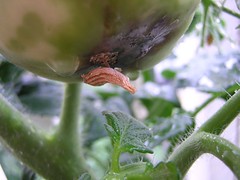If you find any diseased parts on your plants cut them out and discard them in the rubbish. If the plant is too far gone to recover then remove the whole plant but always be careful that in doing so the diseased portions don't come into contact with the other plants, as this will cause it to spread.
| Diseased Super Bush Tomato (Photo credit: grevillea.) |
Many diseases in the garden are spread by insects so keeping control of the insects in your garden will reduce or eliminate the incidence of disease. There are suitable sprays that will help you to eliminate insects in the garden but even these sprays can cause problems. It is essential that the spray dries and the foliage is not left damp because damp foliage can cause disease. Spraying should therefore be done early enough in the day to allow for the foliage to dry out before night - and be sure to only use natural sprays like oils or soaps to avoid introducing dangerous chemicals into your organic garden.
Another area that can harbor disease is in pots that have been used with plants that have had some form of disease. By repotting other plants into these pots you run the risk of those plants also becoming infected. Simply wash out all pots before reusing them. Bleach will generally kill any fungus or bacteria - be sure to rinse the residue out and all traces of the bleach.
Garden hygiene is essential if you want to have a healthy garden. Many people assume that due to the fact that you are working with soil/dirt cleanliness is not important but it is this lack of care that is responsible for the transfer of diseases in the garden.


No comments:
Post a Comment